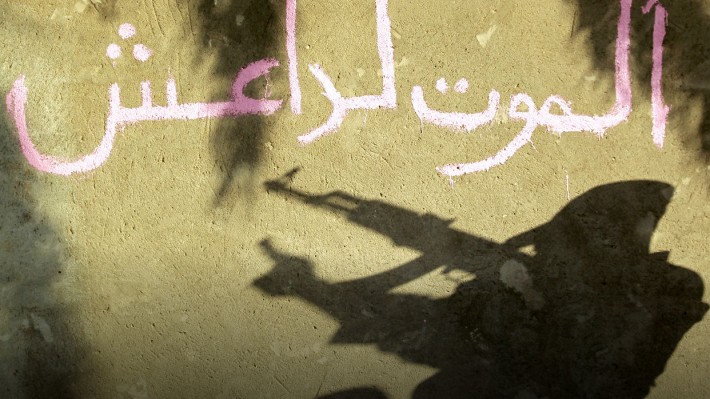Islamic State's morale 'fractured' after air strikes destroy $800m
Lack of disposable cash hits recruitments while defections have jumped 90 per cent, say military commanders

A free daily email with the biggest news stories of the day – and the best features from TheWeek.com
You are now subscribed
Your newsletter sign-up was successful
Islamic State (IS) may have been permanently destabilised after being "financially weakened" by strikes on its oil fields and cash storage sites, say US military commanders.
Major General Peter Gersten, the deputy US commander for operations and intelligence, said up to $800m (£549m) in cash has been destroyed by bombing.
Added to that, the militant group's finances have been "badly hit by battlefield reverses" in which it has lost nearly a quarter of the territory it had seized in Syria and Iraq, reports the Daily Telegraph.
The Week
Escape your echo chamber. Get the facts behind the news, plus analysis from multiple perspectives.

Sign up for The Week's Free Newsletters
From our morning news briefing to a weekly Good News Newsletter, get the best of The Week delivered directly to your inbox.
From our morning news briefing to a weekly Good News Newsletter, get the best of The Week delivered directly to your inbox.
The UK's senior civil servant in charge of undermining Islamic State's finances, Air Vice-Marshal Edward Stringer, said that as cash reserves have become depleted, the group has turned to a more "arbitrary system of taxation and fines", along with extortion and "gangsterism".
This has had a knock-on effect, with a 90 per cent jump in defections and a drop in new arrivals, reports the BBC.
"We're seeing a fracture in their morale, we're seeing their inability to pay, we're seeing the inability to fight, we're watching them try to leave Daesh [IS] in every way," said Gersten. [[{"type":"media","view_mode":"content_original","fid":"94266","attributes":{"class":"media-image"}}]]
Although significant, these assertions are "hard to verify, and could be seen as self-delusion, propaganda or disinformation – all designed to reassure public opinion that IS is being slowly degraded", says The Guardian.
A free daily email with the biggest news stories of the day – and the best features from TheWeek.com
Yet with roughly 60 per cent of the group's total expenditure spent on paying fighters, a lack of disposable cash has had a serious effect on recruitment, according to research by counter-terrorism journal CTC Sentinel.
The concerted attacks on IS-held oil fields, which have put an even greater strain on tax-raising, can be seen as a vindication of coalition policy. This has led many "individuals to regard efforts to understand, and undermine, the group's funding as equally important to military gains", says the Guardian.
However, as the group's control over its self-declared caliphate weakens, the threat to those outside its control is likely to increase. Nato and EU security chiefs have warned IS could "split in two", with some members placing a greater emphasis on Paris-style foreign attacks.
-
 5 cinematic cartoons about Bezos betting big on 'Melania'
5 cinematic cartoons about Bezos betting big on 'Melania'Cartoons Artists take on a girlboss, a fetching newspaper, and more
-
 The fall of the generals: China’s military purge
The fall of the generals: China’s military purgeIn the Spotlight Xi Jinping’s extraordinary removal of senior general proves that no-one is safe from anti-corruption drive that has investigated millions
-
 Why the Gorton and Denton by-election is a ‘Frankenstein’s monster’
Why the Gorton and Denton by-election is a ‘Frankenstein’s monster’Talking Point Reform and the Greens have the Labour seat in their sights, but the constituency’s complex demographics make messaging tricky
-
 Epstein files topple law CEO, roil UK government
Epstein files topple law CEO, roil UK governmentSpeed Read Peter Mandelson, Britain’s former ambassador to the US, is caught up in the scandal
-
 Iran and US prepare to meet after skirmishes
Iran and US prepare to meet after skirmishesSpeed Read The incident comes amid heightened tensions in the Middle East
-
 Syria’s Kurds: abandoned by their US ally
Syria’s Kurds: abandoned by their US allyTalking Point Ahmed al-Sharaa’s lightning offensive against Syrian Kurdistan belies his promise to respect the country’s ethnic minorities
-
 Israel retrieves final hostage’s body from Gaza
Israel retrieves final hostage’s body from GazaSpeed Read The 24-year-old police officer was killed during the initial Hamas attack
-
 China’s Xi targets top general in growing purge
China’s Xi targets top general in growing purgeSpeed Read Zhang Youxia is being investigated over ‘grave violations’ of the law
-
 Syria’s Islamic State problem
Syria’s Islamic State problemIn The Spotlight Fragile security in prison camps leads to escape of IS fighters
-
 Panama and Canada are negotiating over a crucial copper mine
Panama and Canada are negotiating over a crucial copper mineIn the Spotlight Panama is set to make a final decision on the mine this summer
-
 Why Greenland’s natural resources are nearly impossible to mine
Why Greenland’s natural resources are nearly impossible to mineThe Explainer The country’s natural landscape makes the task extremely difficult